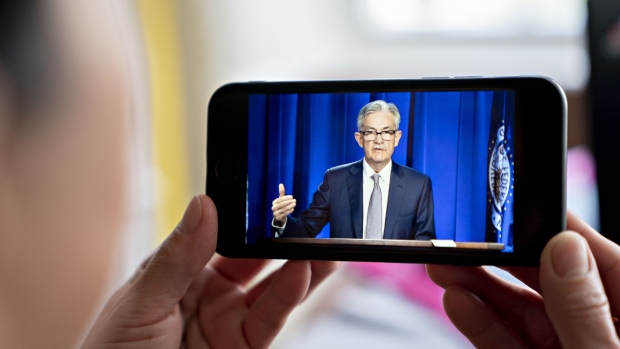Jun 30, 2020
Powell highlights imperative of curbing virus for rebound
, Bloomberg News

Federal Reserve Chair Jerome Powell stressed to Congress Tuesday that getting the coronavirus under control was vital as the U.S. economy rebounds from the sharpest contraction on record.
”We have entered an important new phase and have done so sooner than expected,” Powell told the House Financial Services Committee while wearing a face mask in a joint appearance with U.S. Treasury Secretary Steven Mnuchin. “While this bounceback in economic activity is welcome, it also presents new challenges — notably, the need to keep the virus in check.”
Parts of the U.S. are taking steps to scale back reopenings amid a fresh surge in infection rates, with Arizona closing bars and New Jersey halting plans for indoor dining. Massive monetary and fiscal policy stimulus have been unleashed to support the U.S. economy during the pandemic, but signs the crisis may linger longer will increase pressure for more aid.
Small Business
Lawmakers pressed Mnuchin on government support for small businesses through the Paycheck Protection Program. The deadline to apply for a forgivable loan under PPP is Tuesday and the Treasury Secretary said that money left in fund can be re-purposed by Congress for restaurants and hotels. The travel and leisure industry is among those hardest hit by the pandemic, he said.
The Fed has slashed interest rates to zero and worked with Treasury to launch nine emergency lending programs aimed at providing a credit backstop to everything from municipalities to medium-sized businesses. Those actions helped lower borrowing costs and keep the financial system liquid in a time of stress, while propelling the stock market higher. The Standard and Poor’s 500 stock index is up about 37 per cent from its March lows.
In addition to monetary stimulus, U.S. lawmakers have also approved almost $3 trillion in taxpayer support including direct assistance to small businesses and enhanced unemployment insurance for the many millions of workers who’ve lost jobs since the virus struck.
Fiscal Support
House Democrats questioned Powell and Mnuchin on ways to find more aid for state and local governments and how to more strongly tie government support to jobs.
Dozens of corporations that raise funds in financial markets have benefited from the Fed programs even though they didn’t ask the Fed for a loan. Meanwhile, many are also determining that they will need less staffing for the near future, and are firing workers.
Mnuchin reiterated at the hearing the administration’s goals to pass another round of fiscal stimulus by the “end of July.”
Congressional Republicans have delayed any talks on additional stimulus for a month and half in the hopes that an improving economy would lessen the need for more deficit spending.
The House in May passed a US$3.5-trillion partisan bill with nearly US$1 trillion in aid for states, expanded unemployment insurance through January, another round of US$1,200 stimulus checks as well as funds for Covid testing, broadband Internet expansion and housing assistance among other provisions.
D.O.A.
Senate Majority Leader Mitch McConnell declared the House bill dead on arrival and said that his office would begin drafting the next bill in mid-to-late July after analyzing economic data. McConnell has publicly called for the next bill to include liability protections for businesses seeking to reopen and privately Republicans are seeking to cap any further spending at US$1 trillion or less.
On Monday House Speaker Nancy Pelosi and Senate Minority Leader Chuck Schumer wrote to McConnell urging him to begin immediate bipartisan talks on stimulus given the rising number of Covid cases and stalled reopening in many states. Democrats are also calling on McConnell to cancel the two week Senate recess that begins Thursday to tackle the next relief bill.
‘Extraordinarily Uncertain’
Economists caution that a long period of labor re-allocation — where workers in an industry directly impacted by the virus such as lodging have to find new skills and jobs in other industries — risks keeping unemployment high for years.
The Labor Department will release jobs data for June on Thursday. Forecasters surveyed by Bloomberg see the unemployment rate dropping to 12.5 per cent compared with 13.3 per cent for May.
The Fed chair in his remarks to lawmakers struck an optimistic note on what he is seeing as economic activity resumes. Hiring is picking up, he noted, and spending is increasing, though he cautioned that 20 million Americans have lost their jobs.
“The path forward for the economy is extraordinarily uncertain and will depend in large part on our success in containing the virus,” he said. “A full recovery is unlikely until people are confident that it is safe to re-engage in a broad range of activities.”
As he has in recent appearances, Powell also warned against pulling back on any form of stimulus too soon.
“The path forward will also depend on the policy actions taken at all levels of government to provide relief and to support the recovery for as long as needed,” he said.
--With assistance from Matthew Boesler, Craig Torres, Rich Miller, Erik Wasson and Mark Niquette.


